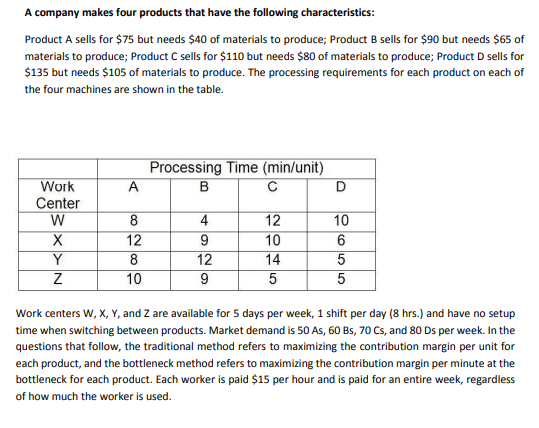A company makes four products that have the following characteristics: Product A sells for $75 but needs $40 of materials to produce; Product B sells for $90 but needs $65 of materials to produce; Product C sells for $110 but needs $80 of materials to produce; Product D sells for $135 but needs $105 of materials to produce. The processing requirements for each product on each of the four machines are shown in the table. Processing Time (min/unit) A B Work Center W 8 12 8 10 12 10 14 4 10 9 12 Work centers W, X, Y, and Z are available for 5 days per week, 1 shift per day (8 hrs.) and have no setup time when switching between products. Market demand is 50 As, 60 Bs, 70 Cs, and 80 Ds per week. In the questions that follow, the traditional method refers to maximizing the contribution margin per unit for each product, and the bottleneck method refers to maximizing the contribution margin per minute at the bottleneck for each product. Each worker is paid $15 per hour and is paid for an entire week, regardless of how much the worker is used.
A company makes four products that have the following characteristics: Product A sells for $75 but needs $40 of materials to produce; Product B sells for $90 but needs $65 of materials to produce; Product C sells for $110 but needs $80 of materials to produce; Product D sells for $135 but needs $105 of materials to produce. The processing requirements for each product on each of the four machines are shown in the table. Processing Time (min/unit) A B Work Center W 8 12 8 10 12 10 14 4 10 9 12 Work centers W, X, Y, and Z are available for 5 days per week, 1 shift per day (8 hrs.) and have no setup time when switching between products. Market demand is 50 As, 60 Bs, 70 Cs, and 80 Ds per week. In the questions that follow, the traditional method refers to maximizing the contribution margin per unit for each product, and the bottleneck method refers to maximizing the contribution margin per minute at the bottleneck for each product. Each worker is paid $15 per hour and is paid for an entire week, regardless of how much the worker is used.
Practical Management Science
6th Edition
ISBN:9781337406659
Author:WINSTON, Wayne L.
Publisher:WINSTON, Wayne L.
Chapter8: Evolutionary Solver: An Alternative Optimization Procedure
Section8.8: Optimal Permutation Models
Problem 15P
Related questions
Question
100%

Transcribed Image Text:A company makes four products that have the following characteristics:
Product A sells for $75 but needs $40 of materials to produce; Product B sells for $90 but needs $65 of
materials to produce; Product C sells for $110 but needs $80 of materials to produce; Product D sells for
$135 but needs $105 of materials to produce. The processing requirements for each product on each of
the four machines are shown in the table.
Processing Time (min/unit)
A
B
Work
Center
W
8
12
8
10
12
10
14
4
10
9
12
Work centers W, X, Y, and Z are available for 5 days per week, 1 shift per day (8 hrs.) and have no setup
time when switching between products. Market demand is 50 As, 60 Bs, 70 Cs, and 80 Ds per week. In the
questions that follow, the traditional method refers to maximizing the contribution margin per unit for
each product, and the bottleneck method refers to maximizing the contribution margin per minute at the
bottleneck for each product. Each worker is paid $15 per hour and is paid for an entire week, regardless
of how much the worker is used.

Expert Solution
This question has been solved!
Explore an expertly crafted, step-by-step solution for a thorough understanding of key concepts.
This is a popular solution!
Trending now
This is a popular solution!
Step by step
Solved in 3 steps

Knowledge Booster
Learn more about
Need a deep-dive on the concept behind this application? Look no further. Learn more about this topic, operations-management and related others by exploring similar questions and additional content below.Recommended textbooks for you

Practical Management Science
Operations Management
ISBN:
9781337406659
Author:
WINSTON, Wayne L.
Publisher:
Cengage,

Practical Management Science
Operations Management
ISBN:
9781337406659
Author:
WINSTON, Wayne L.
Publisher:
Cengage,